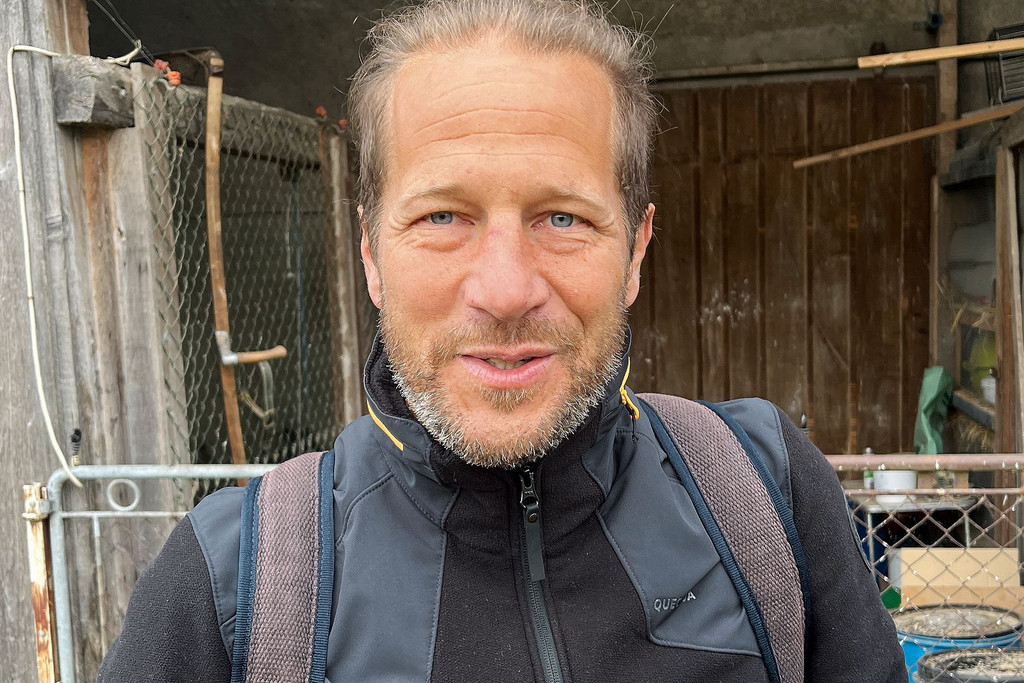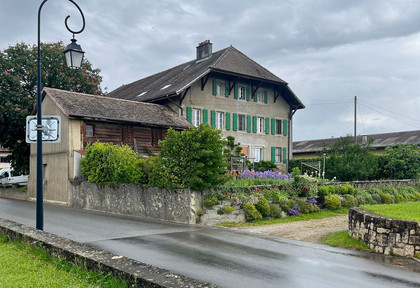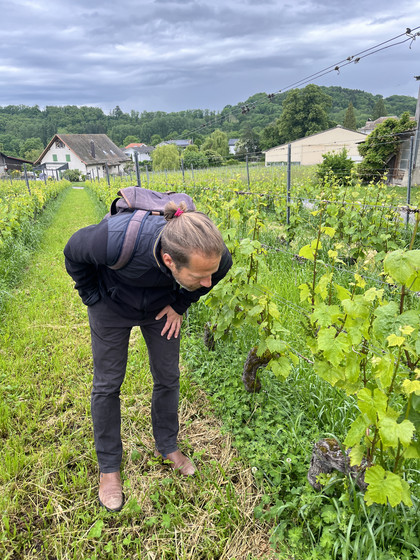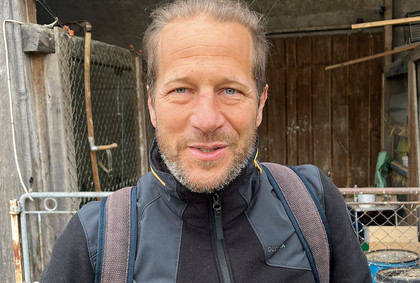
“Grannies” take Switzerland to court to demand more action on climate change

Alan Roura, a child of the sea

The author sounding the alarm on the poor deal for farmers

Santa’s post office

The Swiss heading into space


Author and winemaker Blaise Hofmann paints a portrait of the hard life of agricultural workers in his work “Faire paysan”. He pleads in favour of keeping Swiss agriculture at a human scale.
At the entrance to the village where the Hofmann family farm is located, the Villars-sous-Yens (VD) village nameplate is still upside down, a reminder of the demonstrations in February that stirred up Swiss farmers – who stand in solidarity with French farmers – to fight for greater recognition. “The world has gone topsy-turvy,” says writer and winemaker Blaise Hofmann, the author of “Faire paysan”, an essay published in 2023 about the living conditions of Swiss agricultural workers. Some 1,500 farms have disappeared every year in Switzerland for the past ten years. That works out at four a day. “An entire facet of the world is vanishing – actions, smells, sounds, tastes, expertise, behavioural skills – and we’re acting as if nothing has changed,” says this farmer’s son and grandson, whose great-grandfather committed suicide. Other farmers have done the same in recent years.

We stop in at the family farm, located in the heights of Morges, to say hello to Hofmann’s parents. Walti and Anne-Lise greet us with a big smile. In their kitchen, a famous colour print hangs on the wall: “Le labour dans le Jorat”, by Eugène Burnand. “A member of my family is in this print,” remarks Hofmann. This man of letters and seasoned globetrotter was born in 1978 and has worked as a journalist, shepherd, nursing assistant and teacher. The farm itself is still in operation. Patrick, one of Blaise’s cousins, cultivates its roughly 40 hectares.
There is one thing missing from the picture: cows, and the manure that goes with them. “In the country, dowries used to be calculated based on the size of the manure heap outside the parents’ farm,” the Vaud native writes. He stresses that Switzerland has always had more cows per inhabitant than anywhere else. His cousin Patrick didn’t make more than four to six Swiss francs per hour from his milk. That was the end of his grandfather’s inheritance.
Most of the time, being a farmer is a family tradition. That’s how it was for Blaise’s grandfather, who arrived in Villars-sous-Yens in 1937 with his cows from Belpberg (BE), where “there were no free farms available”. The Vaud village had only two tractors, including his one. “He helped with the farm work at a time when many of the farmers had been conscripted. This helped him to integrate among the locals,” says Walti over a glass of wine made from the Chasselas grapes of his son’s vineyard.
“Faire paysan” gives urban readers an insight into the life of Swiss farmers. It makes you want to get to know the men and women who put food on our table. The essay describes the toughness of the job, the feeling of abandonment encountered by some in the farming sector, and the suicides.

It speaks of some farmers’ anger at the endless “organic” initiatives launched without consultation with anyone working in the industry. It describes a world in which many farmers feel stripped of their freedom and governed by forces beyond their control. These forces include the cooperatives, which favour large farms, the stakeholders in the food sector, who abuse their dominant position, and the Swiss Confederation, which insists that farmers let part of their land lie fallow. “The Swiss Farmers’ Union is defending a broken system,” Blaise Hofmann feels. The writer thinks that now is the time for Switzerland to stand up and preserve “agriculture on a human scale”. The toxic trend arguing for the “vertical integration” of farmers must be stopped.
He cites the example of the National Federation of Consumer Cooperatives, which controls “half the national Swiss market for cereals..., UFA seeds [the most widely used seeds on the Swiss market], Landor fertilisers, Landi stores, Volg supermarkets, Ramseier beverages, Agrola petrol stations and dozens of other companies”. These behemoths dictate not only prices but also the rules for farming, a fact deplored by the Vaud author, who in this essay has strayed from his favourite subject: travel. That was the topic of “Billet aller simple”, published in 2004, which tells the story of his 16-month expedition across Europe, Asia and Africa.
Blaise also has two daughters, and waxes lyrical on the enjoyable side of farming and his encyclopaedic knowledge of the land and its life cycles. “Cows aren’t switched off at the weekend. They continue to exist, just like plants, insects, birds and farmers,” the Vaud native says.

“Faire paysan” makes city-dwellers regret the fact that they’ve been cut off from nature. “Even from behind the windscreens of their tractors, farmers are among the last modern people to be able to read the land,” Blaise writes. Farmers’ associations (to the left and right of the political centre) and green organisations constantly request his services. In June, he was invited to act as a mediator at a round table with the boss of Migros Vaud. He describes the Migros-Coop duopoly as “one of the gravediggers of Swiss agriculture”, but at the same time does not deny that the impact of agriculture over the past 60 years has been a catastrophe for the environment.
What should be done? The first change should be one of policy. Higher duties could be imposed on agricultural imports, particularly from Morocco and Spain, where the human and environmental cost is disastrous. The author calls for a system that would allow caps to be imposed on major retailers’ profit margins, which can reach 57 percent on dairy products. Hofmann also reminds us that the solutions to the current agricultural crisis cannot lie solely in the establishment of microfarms. At the end of the day, consumers can also affect the direction taken by agriculture. “If I insist on buying perfect apples..., that indirectly rules out three-quarters of the farmer’s harvest,” Hofmann concludes. In spite of it all, he still dreams of a world where children will say “Mum, Dad, I want to be a farmer!”
Comments